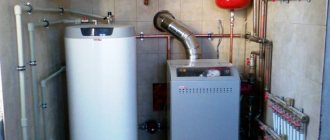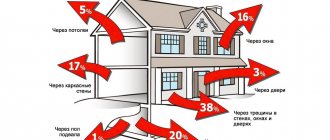All problems need to be resolved while the stakeholders are on shore. When we go to sea, it will be too late to resolve any issues. Before you start building a house, you need to think about how the house will be heated. Which fuel for heating a private home will be cheaper and which will be more expensive.
Which heating is more profitable in the Russian Federation
Before determining the cheapest heating method, we list all the energy resources available to residents of the Russian Federation:
- various types of solid fuel - firewood, briquettes (eurowood), pellets and coal;
- diesel fuel (diesel fuel);
- waste oils;
- main gas;
- liquefied gas;
- electricity.
To figure out which heating is the cheapest, you need to find out how much heat each energy carrier can produce and how much it will cost, and then compare the data obtained. The table containing the calculation results will help you determine the most economical heating:
Note. The prices in the table are taken for Moscow and updated as of July 15, 2022. Due to constant increases in energy costs and currency exchange rate fluctuations, the presented figures become irrelevant over time.
Anyone can perform a similar calculation by substituting the heat load on the heating system of their building and the cost of fuel in the region of residence into the table. The calculation algorithm is as follows:
- Column No. 3 contains the values of the theoretical heat transfer per unit of fuel, and column No. 4 - the efficiency (efficiency) of heating equipment using this energy carrier. These are reference values that remain unchanged.
- The next step is to calculate how much heat actually enters the house from a unit of fuel. The calorific value is multiplied by the boiler efficiency divided by 100. The results are entered in the 5th column.
- Knowing the price of a unit of fuel (column No. 6), it is not difficult to calculate the cost of 1 kW/h of thermal energy obtained from this type of fuel. The unit price is divided by the actual heat transfer, the results are in column No. 7.
- Column No. 8 indicates the average heat consumption per month for a country house with an area of 100 m², located in central Russia. For the calculation you should enter your heat consumption value.
- Average monthly costs for heating a home are indicated in column No. 9. The figure is obtained by multiplying monthly heat consumption by the cost of 1 kW obtained from various types of fuel.
The table shows 2 types of firewood usually available for sale - freshly cut and dry. This will help you understand how profitable it is to heat a stove or boiler with dry wood.
Analysis of calculation results
The calculations show that the most economical heating for private homes in the Russian Federation in 2022 is still provided by natural gas; this energy source remains uncompetitive. Please also take into account the fact that gas-powered equipment is relatively inexpensive, and is quite effective and comfortable to use.
When using condensing boilers, efficiency can be increased by another 5-6% compared to conventional gas heat generators. True, condensing equipment will not be cheap (30-50% more expensive depending on the model).
The problem with gas in the Russian Federation is the high cost of connecting to existing pipelines. To heat your home economically, you will have to shell out 50 thousand rubles. (in remote regions) up to 1 million rubles. (In the Moscow region) for connecting to a gas pipe.
Having found out how much connection costs, many homeowners are wondering how and with what to heat their home without gas. The remaining energy sources are listed in the table:
- Firewood dried and wet. According to column No. 9, it is noticeable that it is much more profitable to burn good dry wood than fresh wood, even if purchased inexpensively. Wood heating equipment is quite affordable for a wide range of users.
- Burning briquettes, pellets and coal can also be considered cheap methods of heating a private house without gas; their cost is approximately the same. One clarification: automatic pellet and coal boilers are more expensive than conventional ones (1.5-2 times).
- Electric heating at night rate. Considering the minimal costs for equipment and its installation, it is quite possible to heat with electricity cheaply, but only at night. A suitable option for both a country house and an apartment.
- Used engine oils occupy a middle position between cheap and expensive energy sources. But burning them is associated with certain difficulties, which will be discussed below.
- Heating with liquefied gas can no longer be considered an advantageous heating method. Especially if you take into account the cost of a gas tank and its installation, cylinders can only be used to heat a dacha.
- Diesel fuel, liquefied gas and electricity at a daily rate are the most expensive energy carriers in the Russian Federation; it is not possible to organize economical heating with their help in the near future.
The use of purely electric equipment for heating a house around the clock cannot be called profitable, since the cheap night tariff is valid for 8 hours a day, and the rest of the time you will have to pay the full rate. So heating with electricity alone will not work cheaply.
Requirements for heating systems of country houses
The general rules adopted by SNiP look quite simple; according to the recommendations of experts, the temperature during the heating period should not fall below 12 degrees. Particular attention is paid to fire safety measures; they will differ for each type of system.
The best location for devices is considered to be under the window openings, and the wiring itself must meet the standards of operational reliability. For air coolant, I advise installing mechanical ventilation, then the result from heating devices will be as efficient as possible. Propylene glycol for the heating system is not prohibited by the rules; this liquid is excellent for various systems.
The cheaper way to heat a house in Ukraine
Due to the increase in the price of firewood in 2022, the overall picture of the cost of heating in Ukraine looks very interesting. The layout is reflected in a similar calculation table:
Note. Electricity tariffs are indicated based on 2 conditions: the home has electric heating according to all the rules and energy consumption does not exceed 3000 kW/h per month.
The first place in terms of cheapness of heating in Ukraine is still occupied by dry firewood and electricity used at night. But due to the rise in price, their cost has practically become equal to the price of natural gas, which has fallen in price by 5...10% (in the current conditions it is not easy to announce the exact figure?).
Please also take into account this point: the table for 2022 shows average fuel prices. Pellets and briquettes of poorer quality can be bought cheaper, and electricity and gas cost the same everywhere. So, energy resources are arranged in the following order (from cheap to expensive):
- electricity at night tariff;
- main gas;
- dried firewood;
- pellets, sawdust briquettes;
- freshly cut wood;
- used oil;
- anthracite coal;
- electricity at a daily rate (for consumption up to 3600 kW/month);
- liquefied gas;
- diesel fuel.
It is impossible to predict the size of gas and electricity tariffs in Ukraine due to the unstable economic situation. It is unlikely that energy resources will become significantly cheaper; subsidy payments are decreasing annually.
On the issue of supplying main gas, Ukrainians are in the same position as Russians, whose houses are not connected to gas pipelines due to the high cost of the service. Both have to burn different types of solid fuel or use electricity at night.
Where are they telling you lies?
Small wholesale fuel suppliers incorrectly interpret concepts such as volume and weight of various energy carriers. It should be understood that volume and mass are completely different concepts, and they cannot be compared under any circumstances.
Euro firewood is actively advertised. Everything looks very attractive in beautiful advertising pictures. It is important not to miss the truth: ordinary firewood produces more heat, and its cost is significantly lower than the cost of so-called Euro-firewood.
How can one correctly calculate the economic feasibility of a particular type of fuel? Very simple. First, get rid of the confusion in tons, cubes, liters and bring all your thoughts to kilograms.
Comparative analysis based on other criteria
In addition to the purely economic calculation of the cost of heating, there are other factors that influence the choice of energy source. For example, it is difficult for an elderly pensioner to chop and carry firewood to the boiler room. Some people don’t like the smell of diesel fuel or the dirt from coal, while others don’t have the opportunity to store a supply of pellets or briquettes. That is, choosing fuel for heating only from the point of view of economy is wrong. Additional criteria need to be taken into account:
- comfort during use;
- possibility of storage;
- frequency and cost of service.
Nuances of operation
It is most convenient to use electricity for heating, although it is difficult to classify it as an economical energy source. The electric boiler does not require supervision, the system is fully automated. The unit is easy to control remotely, and the boiler room is quiet, clean and free of unpleasant odors. An important point: the electrical heating installation does not require a chimney, which greatly simplifies and reduces the cost of installation.
Electric heaters and boilers are the cheapest heating devices; heat generators using other fuels are much more expensive
In addition to the high price, electric heating has another disadvantage. Not every private home has sufficient electrical power or a limit has been set that does not allow the use of energy for heating. And connecting units with a power of over 6 kW requires a 3-phase input with a voltage of 380 V.
It is almost as comfortable to operate boilers that burn natural and liquefied gas. But they require a chimney and good ventilation of the furnace room. Burning diesel and used oil is no longer so comfortable, since an odor inevitably appears and periodic replenishment of the fuel container is required. In this respect, a diesel heat generator is similar to a pellet heat generator, but the latter benefits from the absence of odors and dirt.
The champion in inconvenience is the wood and coal boiler, which requires constant attention and physical exercise. With the most economical method of heating with wood, the smell of combustion and dust mixed with dirt in the boiler room cannot be avoided (especially for coal). An exception is an automatic coal boiler, which operates on the principle of a pellet boiler, but it also requires periodic replenishment of the bunker.
Automatic boilers: pellet (pictured on the right) and coal (on the left)
About fuel storage
The nuances of warehousing and storage are easier to identify in the list:
- The electric and gas heating system of a private house operates from external sources; no storage is needed.
- For reliable operation of any solid fuel boilers, you need a supply of fuel; accordingly, it is necessary to organize its storage. You will have to make a firewood shed under a canopy or a warehouse in a barn.
- The supply of diesel fuel and waste also needs to be stored somewhere and, preferably, outside the residential building. It is necessary to purchase and install a container of sufficient volume.
- The most difficult thing is to organize storage with autonomous heating using liquefied gas as an alternative to natural gas. The cost of an underground gas tank and its installation will quickly make you forget about economical heating of your home.
Not everyone can afford to install a gas tank, and constantly carrying cylinders to refuel is hard work.
There is another, cheaper way to store liquefied gas - in cylinders. But “thanks to” frequent replacement and refilling of cylinders, comfort when operating a propane boiler is equal to exercises with firewood when loading a solid fuel heat generator.
Equipment service
Electric heating systems require virtually no maintenance (check and clean once every 2 years). If it were not for the draconian daily tariff, then with the help of electricity it would be possible to organize a “economical smart home” system. Gas boilers will have to be serviced more often; they require annual preventive cleaning of the heat exchanger and chimney. But here you can save money if you clean the unit yourself, as described in this article.
Due to the low quality of diesel fuel, diesel heat generators will need to be cleaned as they become dirty, which can happen several times a season. The same applies to waste oil boilers, and the cleaning process is very dirty. Faced with problems like this in the middle of winter, you'll think twice about whether you need energy-efficient heating while working.
It is advisable to clean the smoke pipes with the firebox of a boiler using wood and pellets once a week, and the ash pan daily. When working with wet wood from the combustion chamber, it is important to remove soot and tar more often before they become completely stuck.
Electric boilers
Electric boilers have the highest efficiency - up to 98%. Moreover, it does not depend on the type of boiler. Heating element, electrode and induction boilers differ only in the method of heating the coolant, and they have no losses from incomplete combustion of fuel - electricity is almost completely converted into heat. In principle, it would be correct to talk not about the heating system (there is no fuel and combustion chamber), but about the heating method.
In terms of equipment cost, simplicity of design, complete automation and ease of maintenance, electric boilers have no competitors. But their cost per kilowatt of thermal energy is the highest. Although there are loopholes here.
Conclusions and recommendations
After conducting a comprehensive analysis, we can draw the following conclusions about choosing economical heating for a private home:
- Residents of the Russian Federation, whose houses are connected to gas mains, can continue to sleep peacefully - they cannot find a more economical method of heating. Unless you properly insulate your home in order to reduce fuel consumption. In the near future, natural gas will remain uncompetitive.
- The cheapest heating without mains gas is burning solid fuel. But for the sake of financial gain, you will have to sacrifice the time and effort spent on loading firewood and maintaining equipment. In this case, you should pay attention to long-burning solid fuel boilers and choose one of them.
- If you have financial capabilities, the best option for economical heating is a pellet boiler. If you have little space for storing pellets, then the issue can be resolved by periodically supplying pellets during the season, although the purchase cost will then increase.
- The best results in terms of efficiency are obtained by a combination of 2-3 energy carriers. For Russia, the most popular pair is solid fuel and electrics at a night rate. For Ukraine - electricity at night and natural gas during the day (including subsidies and without exceeding the limit of 3600 kW).
- You can only tolerate dirt and odors in the boiler room if you can get used oil inexpensively. Like diesel fuel, mining is not the best option for a residential building, unless you place the equipment in a separate building.
- Residents of the Russian Federation with above-average income can afford to heat their homes with liquefied gas for the sake of comfort. In Ukraine, this method is practically not considered as very uneconomical.
A combination of a wall-mounted gas and electric boiler, the second serves as a backup (night) source of heat.
At the moment, when energy prices tend to European ones, insulation of private houses is becoming increasingly important. This is also a way to get economical heating, because with low heat losses it becomes possible to constantly use an electric boiler with a water heating system or local electric heaters, which is very convenient.
Liquid fuel
This is probably the last option that should be considered when solving the problem of how to heat a house if there is no gas. It's not even about the price of energy resources - they can be different. The most expensive diesel fuel allows you to obtain thermal energy at the same cost as using liquefied gas from cylinders. The price of heat when burning fuel oil is the same as that of coal-fired boilers, and “working off” practically compares heating costs to the level of natural gas. But…
In terms of equipment cost, this is one of the most expensive fuel-using systems. In addition, these boilers are “capricious”, requiring regular maintenance and the same complexity of maintenance as the fuel supply and injection systems of a diesel car. There are also disadvantages such as air pollution from liquid fuel combustion products, as well as high noise levels from the operation of the fuel pump and burner.
Maintenance of an oil-fuel boiler is much more difficult than any other Source enemcon.com
Modern economical technologies
With the help of modern technologies we can achieve the most economical home heating. But we still classify these technologies as unreasonable, because their payback period is quite long. From 10 years and above.
This technology includes a heat pump. With the help of earthly resources, it is capable of producing at least 4 times more energy than it consumes itself. If you need a boiler for your home with a power of 20 kW, then a heat pump with a power of only 5 kW will be suitable for heating. The heat pump runs on electricity. The pump also costs 3-4 times more than a first-class gas boiler with high efficiency.
Solar collectors can be used for heating. There is no energy consumption required at all. When properly installed, solar collectors can heat heated floors and provide you with the necessary amount of hot water. But again, it all comes down to finances.
Our future lies in these technologies. The moment will come when both a heat pump and a solar collector will become available to everyone.
As a result, we get that using a warm floor + temperature control + a heat pump (or collector) we can get truly the most economical home heating.
If you are looking far ahead and are confident that you can afford such expenses, then you definitely will not regret having all this installed at home.
We heat with gas
Gas heating can rightly be considered more profitable if the gas pipe is located in close proximity to the house. To save on connecting to the highway, it is recommended to use the following rules:
- All services must be ordered in one place. This includes design, installation and subsequent service;
- It is necessary to properly prepare the place for the boiler;
- The boiler itself must correspond to the area of the house;
- You should choose the optimal size of the chimney.
The main advantage of gas heating is the low cost of energy. However, in essence, all the advantages end there.
Disadvantages of gas heating
- If the house was not initially connected to the gas main, then the initial connection costs are so high that not everyone can afford it. And if the owner of a house with a plot of land does not foresee income growth in the future, then you can safely install an electric boiler. And don’t worry about the difference in the cost of energy carriers;
- Do not forget that gas is a rather explosive substance. And here, inevitably, you will think again before installing gas heating in your house;
- A gas water heating system is inconvenient for short-term use and takes too long to warm up (when the house is used sporadically during the colder months).
How to make remote control of the heating of a country house with your own hands
The best option would be a GSM socket; I consider this modern device to be the easiest to install to control the heating system yourself. The unit has a built-in temperature sensor, and a maximum load of 4 kW is enough for small country houses.
All radiators must be connected in series, then the device is inserted into a regular socket, the smart heating temperature sensor is able to independently turn off the created system after heating the room to a given temperature, and the owner can do this from any gadget.
Additional ways to save
Additional heating savings can be obtained by installing control equipment:
- If you have radiators, thermostatic heads will not be amiss. They are installed on the radiator supply instead of conventional valves. They perform a simple function - at the desired temperature in the room, they shut off the supply, and when the room cools down, they open it back up. The adjustment is only relevant for heating systems with forced circulation
- If you have heated floors, then it would be a good idea to install a manifold with servo drives and install a thermostat in each room. The servo drive is interfaced with the thermostat and when the required temperature in the room is reached, it shuts off the coolant supply to the heated floor circuit
These two life hacks allow you to achieve additional savings on heating.
Costs with an electric boiler
Now let's look at the capabilities of the electric boiler. In this case, you need to understand whether the allocated power limit is enough for you? Secondly, two-tariff electricity metering is already implemented almost everywhere.
Let's look at two options: single-tariff and two-tariff.
Single tariff option
In the single-tariff version, the cost of heating a house turns out that the cost of 1 kW/h of electricity in the Moscow region for 2022 is 4.04 rubles. In this case, the efficiency of an electric boiler is 1.
Accordingly, the cost of 1 kW/h of heat from an electric boiler is 4.04 rubles. In this case, savings can be achieved by using automation so as not to overheat the room needlessly.
Two-tariff option
In the two-tariff version, together with an electric boiler, a storage tank of the appropriate volume is installed. In this case, the boiler mainly operates at night, at maximum power, at the night tariff.
It heats the room, and excess heat goes into the storage tank. Then, during the day, the room is heated using the heat accumulated at night at the night tariff.
Sometimes this heat is not enough and the boiler does not heat the house, sometimes this heat is produced in excess, so we take into account that heating occurs only at the night rate.
The cost of 1 kW/h of electricity in the Moscow region for 2022 (at night tariff) is 1.26 rubles.
The efficiency of an electric boiler is 1. In this case, the cost of 1 kW/h of heat from an electric boiler is 1.26 rubles.
That is, the cost will be a similar figure to the cost of electricity at the night tariff and will be equal to 1.26 rubles.











